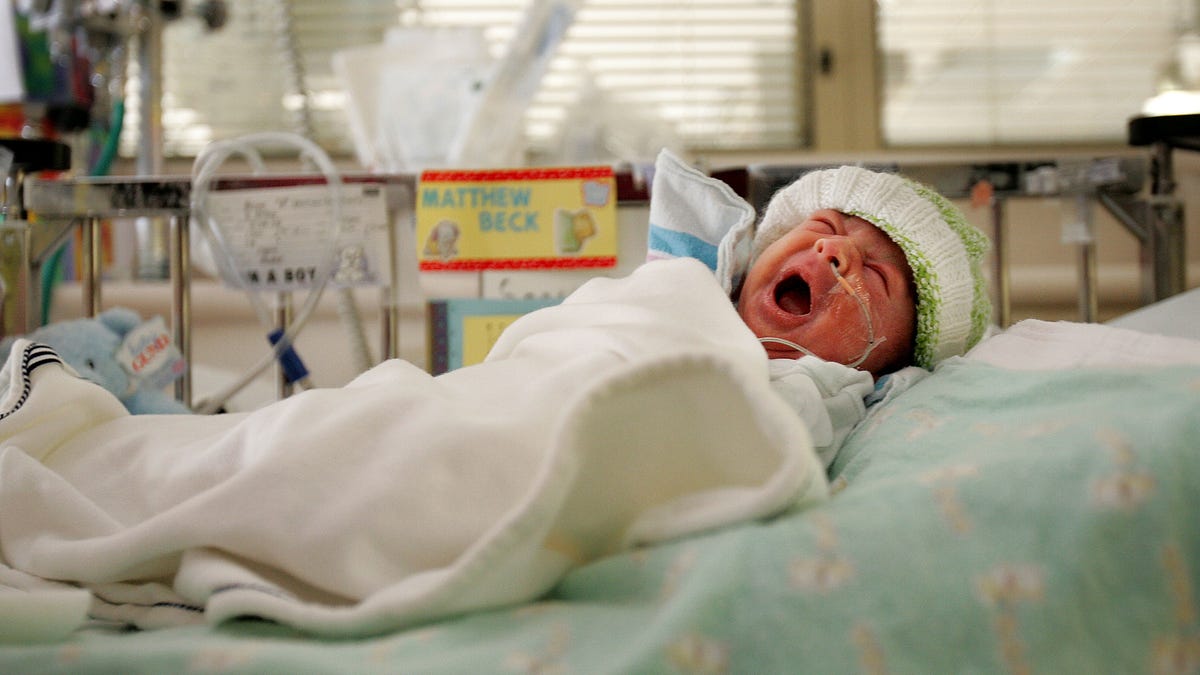
NEW YORK - NOVEMBER 10: Premature baby Matthew Hirsh, born at 28 weeks, lies in the neonatal intensive care unit during a media tour for the March of Dimes' Prematurity Awareness Month at New York University Medical Center November 10, 2004 in New York City. For the first time in nearly 50 years the U.S. infant mortality rate is on the rise due in large part to prematurity, the leading cause of newborn death. (Photo by Mario Tama/Getty Images) (Getty Images)
Hispanic mothers are significantly more likely to have a newborn with serious birth defects of the brain and spine called neural tube defects, according to a new report by the March of Dimes.
Hispanic women have a greater proportion of children each year than any other population in the United States, making it the country’s fastest-growing ethnic group. March of Dimes reports more babies are born prematurely to Hispanic women each year than any other ethnicity.
"One of the things that caught our eye was, while Hispanics represent 17 percent of the population, 24 percent of premature babies are Hispanic," said Dr. Edward McCabe, senior vice president and chief medical officer of the March of Dimes, a nonprofit organization aimed at improving the health of mothers and babies.
Hispanic women’s likeliness of giving birth prematurely was found to be 12 percent higher than white women in 2012. This may be due to risk factors, the report said, such as also being three times more likely to be pregnant before the age of 17 than white women. Hispanic women were found less likely to finish high school and less likely to have health insurance, the report said.
Neural tube defects, in which malformations of the brain and spinal cord could cause disability or death, are an increased risk with premature births.
When researchers examined probable cause of the increased birth defects in Hispanic women, they reasoned that nutrition may play an important role. But they figured out that the defects could be because of one primary factor: masa flour.
Corn masa flour is not typically enriched with essential vitamins and minerals such as folic acid, a B vitamin that can help prevent neural tube defects. Masa, as it is commonly called, is used in making corn tortillas, tamales, pupusas, arepas, and many other Latin American dishes. In the U.S., the Food and Drug Administration requires that wheat flour be fortified with folic acid but masa does not have to meet the same guidelines.
“This is why the March of Dimes is striving to have masa cornmeal fortified with folate,” said Dr. Diana Ramos, co-chair of the new March of Dimes Hispanic Advisory Council and professor of obstetrics and gynecology at the University of Southern California. “Corn masa flour is not part of the standard American diet, so since 2012 we’ve been working on this, making progress slowly.”
The American Academy of Pediatrics, National Council of La Raza and the March of Dimes have all been behind the push to change the ingredients in masa.
Another factor possibly affecting the frequency of these defects may be the unlikeliness of Hispanic women to report taking a multivitamin containing folic acid before becoming pregnant, according to the report.
The March of Dimes has created a Spanish language website, Nacersano.org, which provides information on specific health concerns for Hispanics. In addition to prenatal health, the site is also an outreach effort to raise awareness in the Hispanic community about obesity, diabetes, and smoking.
Follow us on twitter.com/foxnewslatino
Like us at facebook.com/foxnewslatino
